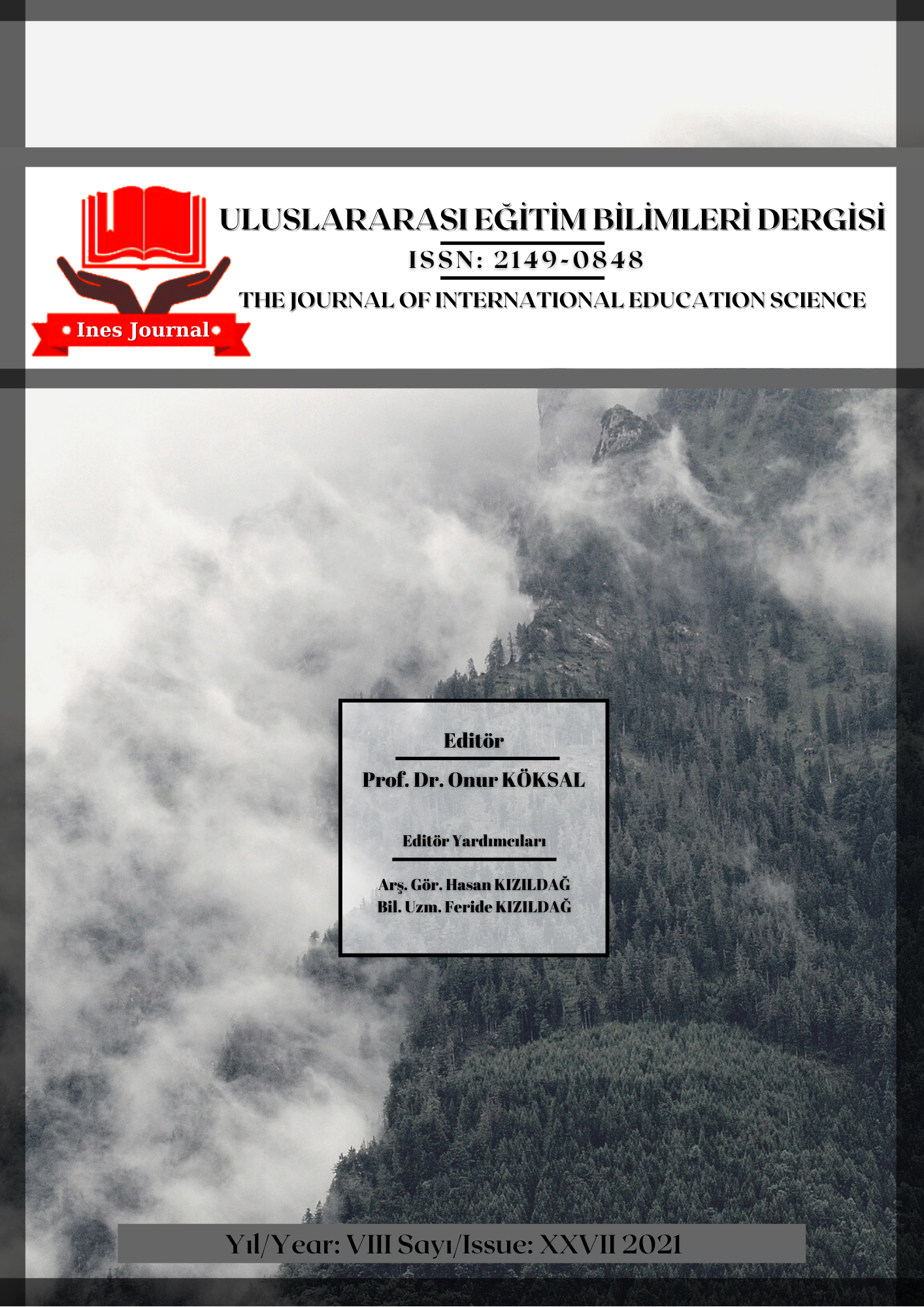İNGİLİZCE DERSİ ÖĞRETİM PROGRAMI KAZANIMLARININ ÖZ DÜZENLEMELİ ÖĞRENME STRATEJİLERİ AÇISINDAN İNCELENMESİ
Author :
Abstract
Bu araştırmanın amacı ortaokul İngilizce dersi öğretim programı kazanımlarında öz düzenlemeli öğrenme stratejilerinin yer alma durumu incelemektir. Araştırma nitel araştırma desenlerinden doküman incelemesine dayalı olarak yapılmıştır. Elde edilen veriler betimsel analiz yöntemiyle çözümlenmiştir. Araştırmada İngilizce dersi öğretim programı kazanımları, Zimmerman ve Pintrich’in öz düzenlemeye dayalı öğrenme modeli kapsamında ortaya koydukları öz düzenlemeye dayalı öğrenme stratejileri birleştirilerek incelenmiştir. Araştırmada incelenen doküman, İngilizce (5-8) dersi Öğretim Programıdır. Araştırmadan elde edilen bulgulara göre kazanımların üst bilişsel öğrenme stratejilerinden; izleme stratejileri, bilişsel öğrenme stratejilerinden; eklemleme ve anlamlandırma stratejileri ile örgütleme stratejilerinde yoğunlaştığı görülürken, planlama, hedef belirleme, tekrarlama, düzenleme, çaba düzenleme, zaman ve çalışma ortamının düzenlenmesi, yardım arama ve motivasyon stratejilerine hiç yer verilmediği görülmüştür. 5.6 ve 7. Sınıf kazanımlarında öz düzenlemeli öğrenme stratejileri dengeli bir dağılım göstermemesine karşılık 8. Sınıf kazanımlarında öz düzenlemeli öğrenme stratejilerinin çok dengeli bir dağılım gösterdiği sonuçları bulunmuştur. Araştırmanın bulguları doğrultusunda öz düzenlemeli öğrenme stratejilerinin kazandırılmasına yönelik kazanımların öğretim programlarında dengeli bir biçimde dağıtılmasına ve daha fazla yer verilmesine yönelik öneriler getirilmiştir.
Keywords
Abstract
The aim of this study is to examine the involvement of self-regulated learning strategies in secondary school English course teaching program outcomes. The research is based on document analysis, one of the qualitative research designs. The obtained data were analyzed by descriptive analysis method. In the research, the achievements of the English lesson curriculum were examined by combining the self-regulated learning strategies that Zimmerman and Pintrich put forward within the scope of the self-regulated learning model. The document examined in the research is the English (5-8) course curriculum. According to the findings obtained from the research, it was seen that the acquisitions among the metacognitive learning strategies; monitoring strategies, cognitive learning strategies; it focused on articulation and interpretation strategies and organization strategies, it was seen that planning, goal setting, repetition, regulation, effort regulation, time and work environment regulation, help seeking and motivation strategies were not included. Although self-regulated learning strategies did not show a balanced distribution in 5. 6. and 7th grade acquisitions, it was found that self-regulated learning strategies showed a very balanced distribution in 8th grade outcomes. In the respect of the findings of the study, it is suggested that the acquisitions for the self-regulated learning strategies in the curriculum should be distributed balancedly and included more.
Keywords
- Azevedo, R. (2009). Theoretical, conceptual, methodological, and instructional issues in research on metacognition and self-regulated learning: A discussion. Metacognition and Learning 4(1), 87–95.
- Boekaerts, M. (1997). Self-regulated learning: a new concept embraced by researchers, policy makers, educators, teachers and student. Learning and Instruction. 7(2), 161-186.
- Boekeerts, M. ve Niemivirta, M. (2005). Self-regulated learning: finding a balance between lear- ning goals and ego-protective goals. _çinde M. Boekarters, P.R. Pintrich ve M. Zeidner (ed), (ss: 417–450). Handbook of Self Regulation, San Diego: Academic Press.
- Cheng, E. C. K. (2011). The role of self-regulated learning in enhancing learning performance. The International Journal of Research and Review, 6 (1), 1–16.
- Eker, C. (2014). Öz-düzenlemeli öğrenme modellerine karşılaştırmalı bir bakış. Turkiish Studies- International Periodical For The Languages, Literature and History of Turkic, 9(8), 417-433.
- Eker, C. (2017). Eğitimde Yeni Yönelimler, A. Arslan (Ed.), Eğitim Bilimine Giriş içinde (s:267- 301). Ankara: Nobel Akademik Yayıncılık.
- Froiland, J. M., Oros, E., Smith, L. ve Hirchert, T. (2012). Intrinsic Motivation to Learn: The Nexus between Psychological Health and Academic Success, Contemporary School Psychology, 16, 91-100.
- Heo, H. (2000). Theoretical underpinnings for structuring the classroom as self-regulated lear- ning environment. Educational Technology Intentional, 2(1), 31–51.
- Kuşdemir Kayıran, B., ve Doğanay, A. (2017). The effects of self-regulated learning on academic achievement in reading and self-regulation skills. Uluslararası Eğitim Programları Ve Öğretim Çalışmaları Dergisi, 7(14), 89-112.
- McMillan, W. J. (2010). ‘Your thrust is to understand’–how academically successful students learn. Teaching in Higher Education, 15(1), 1-13.
- Martin, J. (2004). Self-regulated learning, social cognitive theory, and agency. Educational Psycholo- gist, 39 (2), 135-145.
- MEB. (2018). İngilizce dersi öğretim programı. Ankara.
- Merriam, S. B. (1998). Qualitative research and case study applications in education. London: Sage.
- Pintrich, P. R. ve De Groot, E. V. (1990). Motivational and self-regulated learning components of classroom academic performance. Journal of Educational Pyschology, 82(1), 33–40.
- Pintrich, P. R. (1995). Understanding self-regulated learning. In P.R. Pintrich (Ed.), Understan- ding self-regulated learning (pp. 3-12). San Francisco, CA: Jossey-Bass.
- Pintrich, P. R. (2000). Handbook of self-regulation: theory, research and applications. In M. Boekaerts, P. R. Pintrich & M. Zeidner (Eds.), The roal of goal orientation in selfregulated learning (pp. 452–502) İçinde, San Diego, CA: Academic Pres.
- Rogaten, J., Moneta, G., & Spada, M. (2013). Academic performance as a function of approaches to studying and affect in studying. J Happiness Stud, 14, 1751–1763
- Schunk, D. H. (1994). Self-regulation of self efficancy and attributions in academic settings, D. Schunk, B. J. Zimmerman. (ed.). Self-Regulation of Learning and Performance, New Jersey: Lawrence Erlbaum Associates Publisher.
- Sıcak, A., ve Eker, C. (2016). Hayat bilgisi öğretim programı kazanımlarının öz düzenleme becerileri açısından incelenmesi. Mersin Üniversitesi Eğitim Fakültesi Dergisi, 12(1), 129144.
- Yenice, N., Saydam, G., Telli, S. (2012). İlköğretim Öğrencilerinin Fen Öğrenmeye Yönelik Mo- tivasyonlarını Etkileyen Faktörlerin Belirlenmesi, Ahi Evran Üniversitesi Kırşehir Eğitim Fakültesi Dergisi (KEFAD), 13(2), 231-247.
- Yıldırım, A. ve Şimşek, H. (2016). Sosyal bilimlerde nitel araştırma yöntemleri. Ankara: Seçkin Yayıncılık.
- Zimmerman, B. J. (1998). Developing self-fulfilling cycles of academic regulation: An analysis of exemplary instructional models. In D. H. Schunk & B. J. Zimmerman (ed.), Selfregulated learning: from teaching to self-reflective practice (pp. 1–20) İçinde, New York, NY: The Guilford press.
- Zimmerman, B. J. (2000). Attaining Self-Regulation: A Social Cognitive Perspective. Boekaerts, M., Pintrich, P. R., Zeidner, M. (Ed.) Handbook of Self-Regulation (s. 13–39). Academic Press: California EXTENDED ABSTRACT
